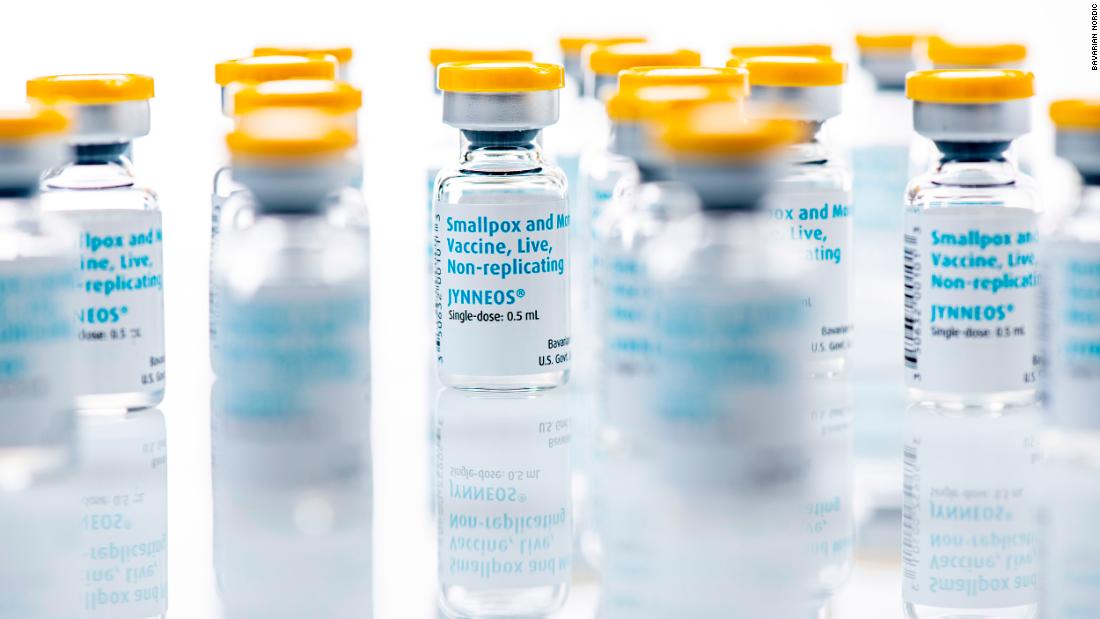
(CNN)The US Food and Drug Administration issued an emergency use authorization Tuesday that allows health-care providers to change how the Jynneos monkeypox vaccine is administered, stretching out the supply amid high demand.
The vaccine can now be given to high-risk adults intradermally, meaning between the layers of the skin, rather than subcutaneously, or under the skin, as it has been given up till now. This will allow providers to get five doses out of a standard one-dose vial.
The new EUA also allows subcutaneous vaccination in people under 18 who are at high risk of infection.
"In recent weeks the monkeypox virus has continued to spread at a rate that has made it clear our current vaccine supply will not meet the current demand," FDA Commissioner Dr. Robert M. Califf said in a statement. "The FDA quickly explored other scientifically appropriate options to facilitate access to the vaccine for all impacted individuals. By increasing the number of available doses, more individuals who want to be vaccinated against monkeypox will now have the opportunity to do so."
The move comes less than a week after the Biden administration declared monkeypox a public health emergency, which gives the FDA and other government health agencies more flexibility to fight the spread of the virus.
Earlier Tuesday, US Department of Health and Human Services Secretary Xavier Becerra issued a determination to pave the way for the FDA's move.
"Last week, I declared monkeypox to be a public health emergency to unlock additional tools that will help us contain and end this outbreak and to signal to the American people that we are taking our response to the next level," Becerra said in a statement. "Today's action will allow FDA to exercise additional authorities that may increase availability of vaccines to prevent monkeypox while continuing to ensure the vaccine meets high standards for safety, effectiveness and manufacturing quality."
As of Monday, the US government has shipped 617,693 doses of Jynneos to states and jurisdictions. The US Centers for Disease Control and Prevention has estimated that at least 1.5 million people in the US are eligible for monkeypox vaccination.
As of Monday evening, the CDC reports 8,934 probable or confirmed monkeypox cases in 49 states, Puerto Rico and the District of Columbia.
With an intradermal vaccination, "basically, you're staying in the skin; you're not going through the skin," said Dr. Daniel Griffin, an infectious disease specialist at Columbia University.
Using a smaller dose with intradermal injection has been done with vaccines for flu and rabies, epidemiologist Dr. Jay Varma told CNN in an email.
"The skin has special cells that are very good at helping a vaccine stimulate the body's immune system," he wrote.
Get CNN Health's weekly newsletter
Sign up here to get The Results Are In with Dr. Sanjay Gupta every Tuesday from the CNN Health team.
These cells, called dendritic cells, are better able to produce an immune response, Griffin said.
"They live in the skin, and they're better at teaching the immune system what they need to respond to," he said.
"If you're able to give the monkeypox vaccine intradermally, you can give a smaller dose. ... They just would need to have some sort of demonstration that you get the same immune response," he said.
Health - Latest - Google News
August 10, 2022 at 03:06AM
https://ift.tt/iOm4xb9
FDA authorizes change in how monkeypox vaccine is given, stretching supply amid high demand - CNN
Health - Latest - Google News
https://ift.tt/tl8CdYH

No comments:
Post a Comment